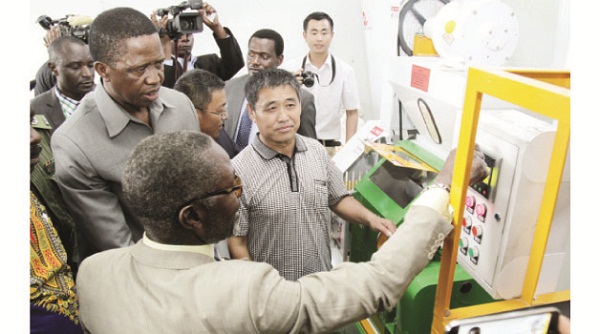
Residents of Chipata town in eastern Zambia have hailed the solar-powered milling plants installed in the area for availing cheaper mealie-meal and providing jobs for locals.
The project to install solar-powered milling plants was one of the outcomes of Zambian President Edgar Lungu's visit to China in March 2015.
The solar-powered milling plants were procured under a loan from the China Development Bank and in total, about 2,000 plants will be installed across the southern African nation.
Starting in 2015, the installation is being undertaken by the Zambia Cooperative Federation (ZCF) and as of last year, 250 had been installed across the country.
The milling plants are expected to create about 3,000 jobs for local people.
Residents told Xinhua correspondents who visited some of the plants on the eastern outskirts of the town that the plants had come at a right time to ease problems such as long distance they used to cover to have their maize milled.
"The plant is near my house, so I don't need to look for any transport like before for me to take my maize for milling. This is good and we hope more plants could be brought here," one resident Elizabeth Phiri told Xinhua.
Another resident Beatrice Phiri told Xinhua that the solar-powered plant were more reliable compared to the other hammer mills which use electricity and diesel.
"In the past if there is no electricity, we had problems to take our maize for milling. Sometimes you would go to the hammer mill and find that there is no diesel," she added.
Other residents also praised the solar-powered plants for being cheaper than the other hammer mills.
Stephen Phiri, an operator of one of the plants, said the plant started operating in June last year, when the ZCF provided some maize that enabled them to sell the mealie-meal at a cheaper price.
He however said this has changed as the price at which mealie meal was being sold has slightly gone up after the maize supply from ZCF stopped.
"Currently we are selling a 25 kilogram of breakfast mealie meal at 85 Kwacha(about 8.6 U.S. dollars) while roller meal is at 80 kwacha. But when we started with ZCF maize we were selling at 66 kwacha," he said.
He however expressed optimism that the price will come down once the new maize comes on the market in the next few months.
Apart from milling maize for sell, the plant also mills maize for other people as well as sells bran, a by-product in the milling process that is sold to farmers and local people who use it as feedstock for their animals.
Source:xinhua